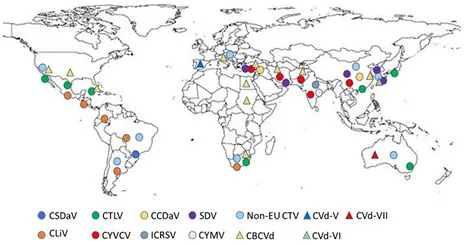Less than two months before the start of the citrus fruit campaign, the difficulties linked to production are emerging in Sicily. First of all, there are the problems caused by the main plant diseases. Times have changed with globalization and the effects of virus-related disease propagation must be tackled "globally".

FreshPlaza talked about it with Antonino Catara (President of the International Organization of Citrus Virologists) and Grazia Licciardello (Molecular biologist at CREA in Acireale) following a recent study published on Agriculture which analyzed the data available on the Global database of the European Plant Protection Organization 2021. The study highlighted how numerous citrus fruit viruses and viroids absent or rare in the Mediterranean area are relevant for the future of citrus fruit production of the entire Mediterranean basin.
 Antonino Catara
Antonino Catara
It also emerged that their distribution in the various Countries does not only depend on the reaction to climatic factors and modes of transmission, but it is also connected to the different monitoring activities performed by the various plant protection services and national systems certifying the propagation materials.
"Considering the possible risks, it would be preferable to promote the use of new pathogen detection technologies, train personnel and raise the awareness of operators and consumers. Finally, a better coordination of phytosanitary surveillance activities in the Mediterranean would lead to an adjustment of national legislations on the matter, favoring the sustainable development of citrus fruit productions in Mediterranean countries. This would have a positive effect on producers, consumers and the environment," explained Catara and Licciardello.
 Grazia Licciardello
Grazia Licciardello
"The most pressing problem remains the risk of diffusion of CTV isolates, which cause malformations of the trunk and branches of sweet orange plants, with a depletion of the quantity and quality of productions even if plants are grafted on tolerant rootstocks. For such isolates, the EU has urged for monitoring in the fields, the execution of molecular tests and bioassays on indicator plants. A lot of attention should also be paid to the virus responsible of tatter leaf, introduced in many countries through collectors' plants and which causes serious problems to plants grafted on trifoliate orange hybrids."
"The virus can be already found in the EU on apple and pear trees as well as on many other species. It is therefore necessary to ascertain the absence of such pathogen on citrus fruit according to EPPO guidelines on phytosanitary surveillance. The final objective for Italian citrus fruit productions is to obtain the voluntary certification ("Qualità Italia") of the propagation material envisaged by Legislative Decree no. 19 of 2 February 2021."
